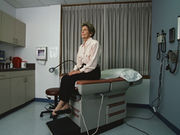Age >60 years, history of smoking, history of gross hematuria strongly predict urologic cancer
TUESDAY, Feb. 7, 2017 (HealthDay News) — Older age, history of smoking, and gross hematuria predict urologic cancer in women with microscopic hematuria, according to a study published in the February issue of the American Journal of Obstetrics & Gynecology.
Quinn K. Lippmann, M.D., M.P.H., from San Diego Medical Center, and colleagues examined risk factors associated with urologic cancer in women with microscopic hematuria in a retrospective cohort study. All urinalyses with microscopic hematuria that were performed from 2009 to 2015 were identified. A total of 14,539 women were referred for urologic evaluation; clinical data were obtained for 3,573 women.
The researchers found that the overall rate of urologic cancer was 1.3 percent; the rate was 0.6 and 2.2 percent in women aged <60 years versus those aged ≥60 years. The rate of urologic cancer was 5.8 percent in women who reported a history of gross hematuria versus 0.8 percent in those with no history of gross hematuria. Age >60 years, history of smoking, and history of gross hematuria in the past six months correlated with urologic cancer in multivariate analysis (odds ratios, 3.1, 3.2, and 6.2, respectively). Higher microscopic hematuria risk score correlated with increased risk of cancer. The rate of urologic cancer was 10.8 versus 0.5 percent for women in the highest- versus the lowest-risk group.
“In this female population, >60 years old and a history of smoking and/or gross hematuria were the strongest predictors of urologic cancer,” the authors write.
Two authors disclosed financial ties to UpToDate.
Full Text (subscription or payment may be required)
Copyright © 2017 HealthDay. All rights reserved.








